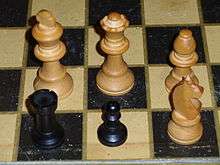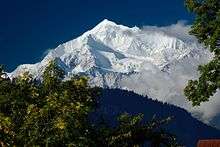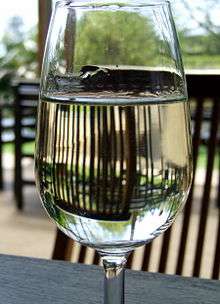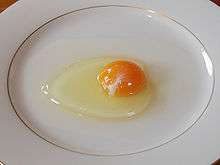Definify.com
Webster 1913 Edition
White
White
(hwīt)
, Adj.
[
Com
par.
Whiter
(hwīt′ẽr)
; sup
erl.
Whitest
.] [OE.
whit
, AS. hwīt
; akin to OFries. and OS. hwīt
, D. wit
, G. weiss
, OHG. wīz
, hwīz
, Icel. hvītr
, Sw. hvit
, Dan. hvid
, Goth. hweits
, Lith. szveisti
, to make bright, Russ. sviet’
light, Skr. çvēta
white, çvit
to be bright. √42. Cf. Wheat
, Whitsunday
.] 1.
Reflecting to the eye all the rays of the spectrum combined; not tinted with any of the proper colors or their mixtures; having the color of pure snow; snowy; – the opposite of
“Pearls white.” black
or dark
; as,
. white
paper; a white
skinChaucer.
White as the
whitest
lily on a stream. Longfellow.
2.
Destitute of color, as in the cheeks, or of the tinge of blood color; pale; pallid;
as,
. white
with fearOr whispering with
They come! they come!”
white
lips, “The foe!They come! they come!”
Byron.
3.
Having the color of purity; free from spot or blemish, or from guilt or pollution; innocent; pure.
White
as thy fame, and as thy honor clear. Dryden.
No
whiter
page than Addison's remains. Pope.
4.
Gray, as from age; having silvery hair; hoary.
Your high engendered battles 'gainst a head
So old and
So old and
white
as this. Shakespeare
5.
Characterized by freedom from that which disturbs, and the like; fortunate; happy; favorable.
On the whole, however, the dominie reckoned this as one of the
white
days of his life. Sir W. Scott.
6.
Regarded with especial favor; favorite; darling.
Come forth, my
white
spouse. Chaucer.
I am his
white
boy, and will not be gullet. Ford.
☞ White is used in many self-explaining compounds, as white-backed, white-bearded, white-footed.
White alder
. (Bot.)
See
– Sweet pepper bush
, under Pepper
. White ant
(Zool.)
, any one of numerous species of social pseudoneuropterous insects of the genus
– Termes
. These insects are very abundant in tropical countries, and form large and complex communities consisting of numerous asexual workers of one or more kinds, of large-headed asexual individuals called soldiers, of one or more queens (or fertile females) often having the body enormously distended by the eggs, and, at certain seasons of numerous winged males, together with the larvae and pupae of each kind in various stages of development. Many of the species construct large and complicated nests, sometimes in the form of domelike structures rising several feet above the ground and connected with extensive subterranean galleries and chambers. In their social habits they closely resemble the true ants. They feed upon animal and vegetable substances of various kinds, including timber, and are often very destructive to buildings and furniture. White arsenic
(Chem.)
, arsenious oxide,
– As2O3
, a substance of a white color, and vitreous adamantine luster, having an astringent, sweetish taste. It is a deadly poison. White bass
(Zool.)
, a fresh-water North American bass (
– Roccus chrysops
) found in the Great Likes. White bear
(Zool.)
, the polar bear. See under
– Polar
. White blood cell
. (Physiol.)
See
– Leucocyte
. White brand
(Zool.)
, the snow goose.
– White brass
, a white alloy of copper; white copper.
– White campion
. (Bot.)
(a)
A kind of catchfly (
Silene stellata
) with white flowers. (b)
A white-flowered Lychnis (
– Lychnis vespertina
). White canon
(R. C. Ch.)
, a Premonstratensian.
– White caps
, the members of a secret organization in various of the United States, who attempt to drive away or reform obnoxious persons by lynch-law methods. They appear masked in white. Their actions resembled those of the Ku Klux Klan in some ways but they were not formally affiliated with the Klan, and their victims were often not black.
– White cedar
(Bot.)
, an evergreen tree of
– North America
(Thuja occidentalis
), also the related Cupressus thyoides
, or Chamaecyparis sphaeroidea
, a slender evergreen conifer which grows in the so-called cedar swamps of the Northern and Atlantic States
. Both are much valued for their durable timber. In California
the name is given to the Libocedrus decurrens
, the timber of which is also useful, though often subject to dry rot. Goodale.
The white cedar of Demerara, Guiana, etc., is a lofty tree (Icica altissima
syn. Bursera altissima
) whose fragrant wood is used for canoes and cabinetwork, as it is not attacked by insect. White cell
. (Physiol.)
See
– Leucocyte
. White cell-blood
(Med.)
, leucocythaemia.
– White clover
(Bot.)
, a species of small perennial clover bearing white flowers. It furnishes excellent food for cattle and horses, as well as for the honeybee. See also under
– Clover
. White copper
, a whitish alloy of copper. See
– German silver
, under German
. White copperas
(Min.)
, a native hydrous sulphate of iron; coquimbite.
– White coral
(Zool.)
, an ornamental branched coral (
– Amphihelia oculata
) native of the Mediterranean. White corpuscle
. (Physiol.)
See
– Leucocyte
. White cricket
(Zool.)
, the tree cricket.
– White crop
, a crop of grain which loses its green color, or becomes white, in ripening, as wheat, rye, barley, and oats, as distinguished from a green crop, or a root crop.
– White currant
(Bot.)
, a variety of the common red currant, having white berries.
– White daisy
(Bot.)
, the oxeye daisy. See under
– Daisy
. White damp
, a kind of poisonous gas encountered in coal mines.
Raymond.
– White elephant
(Zool.)
, (a)
a whitish, or albino, variety of the Asiatic elephant.
(b)
see
– white elephant
in the vocabulary. White elm
(Bot.)
, a majestic tree of North America (
– Ulmus Americana
), the timber of which is much used for hubs of wheels, and for other purposes. White ensign
. See
– Saint George's ensign
, under Saint
. White feather
, – White fir
(Bot.)
, a name given to several coniferous trees of the Pacific States, as
– Abies grandis
, and Abies concolor
. White flesher
(Zool.)
, the ruffed grouse. See under
Ruffed
. [Canada]
– White frost
. See
– Hoarfrost
. White game
(Zool.)
, the white ptarmigan.
– White garnet
(Min.)
, leucite.
– White grass
(Bot.)
, an American grass (
– Leersia Virginica
) with greenish-white paleae. White grouse
. (Zool.)
(a)
The white ptarmigan.
(b)
The prairie chicken.
[Local, U. S.]
– White grub
(Zool.)
, the larva of the June bug and other allied species. These grubs eat the roots of grasses and other plants, and often do much damage.
– White hake
(Zool.)
, the squirrel hake. See under
– Squirrel
. White hawk
, or
White kite
(Zool.)
, the hen harrier.
– White heat
, the temperature at which bodies become incandescent, and appear white from the bright light which they emit.
– White hellebore
(Bot.)
, – White herring
, a fresh, or unsmoked, herring, as distinguished from a red, or cured, herring.
[R.]
Shak.
– White hoolet
(Zool.)
, the barn owl.
[Prov. Eng.]
– White horses
(Naut.)
, white-topped waves; whitecaps.
– The White House
. See under
– House
. White ibis
(Zool.)
, an American ibis (
– Guara alba
) having the plumage pure white, except the tips of the wings, which are black. It inhabits tropical America and the Southern United States. Called also Spanish curlew
. White iron
. (a)
Thin sheets of iron coated with tin; tinned iron.
(b)
A hard, silvery-white cast iron containing a large proportion of combined carbon.
– White iron pyrites
(Min.)
, marcasite.
– White land
, a tough clayey soil, of a whitish hue when dry, but blackish after rain.
[Eng.]
– White lark
(Zool.)
, the snow bunting.
– White lead
. (a)
A carbonate of lead much used in painting, and for other purposes; ceruse.
(b)
(Min.)
Native lead carbonate; cerusite.
– White leather
, buff leather; leather tanned with alum and salt.
– White leg
(Med.)
, milk leg. See under
– Milk
. White lettuce
(Bot.)
, rattlesnake root. See under
– Rattlesnake
. White lie
. See under
– Lie
. White light
. (a)
(Physics)
Light having the different colors in the same proportion as in the light coming directly from the sun, without having been decomposed, as by passing through a prism. See the Note under , 1.
Color
, Noun.
(b)
A kind of firework which gives a brilliant white illumination for signals, etc.
– White lime
, a solution or preparation of lime for whitewashing; whitewash.
– White line
(Print.)
, a void space of the breadth of a line, on a printed page; a blank line.
– White meat
. (a)
Any light-colored flesh, especially of poultry.
(b)
Food made from milk or eggs, as butter, cheese, etc.
Driving their cattle continually with them, and feeding only upon their milk and
– white meats
. Spenser.
White merganser
(Zool.)
, the smew.
– White metal
. (a)
Any one of several white alloys, as pewter, britannia, etc.
(b)
(Metal.)
A fine grade of copper sulphide obtained at a certain stage in copper smelting.
– White miller
. (Zool.)
(a)
The common clothes moth.
(b)
A common American bombycid moth (
– Spilosoma Virginica
) which is pure white with a few small black spots; – called also ermine moth
, and virgin moth
. See Woolly bear
, under Woolly
. White money
, silver money.
– White mouse
(Zool.)
, the albino variety of the common mouse.
– White mullet
(Zool.)
, a silvery mullet (Mugil curema
) ranging from the coast of the United States to Brazil; – called also blue-back mullet
, and liza
. – White nun
(Zool.)
, the smew; – so called from the white crest and the band of black feathers on the back of its head, which give the appearance of a hood.
– White oak
. (Bot.)
See under
– Oak
. White owl
. (Zool.)
(a)
The snowy owl.
(b)
The barn owl.
– White partridge
(Zool.)
, the white ptarmigan.
– White perch
. (Zool.)
(a)
A North American fresh-water bass (
Morone Americana
) valued as a food fish. (b)
The croaker, or fresh-water drum.
(c)
Any California surf fish.
– White pine
. (Bot.)
See the Note under
– Pine
. White poplar
(Bot.)
, a European tree (
– Populus alba
) often cultivated as a shade tree in America; abele. White poppy
(Bot.)
, the opium-yielding poppy. See
– Poppy
. White powder
, a kind of gunpowder formerly believed to exist, and to have the power of exploding without noise.
[Obs.]
A pistol charged with
– white powder
. Beau. & Fl.
White precipitate
. (Old Chem.)
See under Precipitate
. – White rabbit
. (Zool.)
(a)
The American northern hare in its winter pelage.
(b)
An albino rabbit.
– White rent
, (a)
(Eng. Law)
Formerly, rent payable in silver; – opposed to black rent. See , 3.
Blackmail
, Noun.
(b)
A rent, or duty, of eight pence, payable yearly by every tinner in Devon and Cornwall to the Duke of Cornwall, as lord of the soil.
[Prov. Eng.]
– White rhinoceros
. (Zool.)
(a)
The one-horned, or Indian, rhinoceros (
Rhinoceros Indicus
). See Rhinoceros
. (b)
The umhofo.
– White ribbon
, the distinctive badge of certain organizations for the promotion of temperance or of moral purity;
– as, the
. White-ribbon
ArmyWhite rope
(Naut.)
, untarred hemp rope.
– White rot
. (Bot.)
(a)
Either of several plants, as marsh pennywort and butterwort, which were thought to produce the disease called rot in sheep.
(b)
A disease of grapes. See
– White rot
, under Rot
. White sage
(Bot.)
, a white, woolly undershrub (
– Eurotia lanata
) of Western North America; – called also winter fat
. White salmon
(Zool.)
, the silver salmon.
– White salt
, salt dried and calcined; decrepitated salt.
– White scale
(Zool.)
, – White shark
(Zool.)
, a species of man-eating shark.
See under Shark
. – White softening
. (Med.)
See
– Softening of the brain
, under Softening
. White spruce
. (Bot.)
See , 1.
– Spruce
, Noun.
White squall
(Naut.)
, a sudden gust of wind, or furious blow, which comes up without being marked in its approach otherwise than by whitecaps, or white, broken water, on the surface of the sea.
– White staff
, the badge of the lord high treasurer of England.
Macaulay.
– White stork
(Zool.)
, the common European stork.
– White sturgeon
. (Zool.)
See
– Shovelnose
(d)
. White sucker
. (Zool.)
(a)
The common sucker.
(b)
The common red horse (
– Moxostoma macrolepidotum
). White swelling
(Med.)
, a chronic swelling of the knee, produced by a strumous inflammation of the synovial membranes of the kneejoint and of the cancellar texture of the end of the bone forming the kneejoint; – applied also to a lingering chronic swelling of almost any kind.
– White tombac
. See
– Tombac
. White trout
(Zool.)
, the white weakfish, or silver squeteague (
– Cynoscion nothus
), of the Southern United States. White vitriol
(Chem.)
, hydrous sulphate of zinc. See
– White vitriol
, under Vitriol
. White wagtail
(Zool.)
, the common, or pied, wagtail.
– White wax
, beeswax rendered white by bleaching.
– White whale
(Zool.)
, the beluga.
– White widgeon
(Zool.)
, the smew.
– White wine
. any wine of a clear, transparent color, bordering on white, as Madeira, sherry, Lisbon, etc.; – distinguished from wines of a deep red color, as port and Burgundy.
“White wine of Lepe.” Chaucer.
– White witch
, a witch or wizard whose supernatural powers are supposed to be exercised for good and beneficent purposes.
Addison.
Cotton Mather.
– White wolf
. (Zool.)
(a)
A light-colored wolf (
Canis laniger
) native of Thibet; – called also chanco
, golden wolf
, and Thibetan wolf
. (b)
The albino variety of the gray wolf.
– White wren
(Zool.)
, the willow warbler; – so called from the color of the under parts.
White
,Noun.
1.
The color of pure snow; one of the natural colors of bodies, yet not strictly a color, but a composition of all colors; the opposite of black; whiteness. See the Note under , 1.
Color
, Noun.
Finely attired in a of
white
. Shakespeare
2.
Something having the color of snow; something white, or nearly so;
as, the
. white
of the eye3.
Specifically, the central part of the butt in archery, which was formerly painted white; the center of a mark at which a missile is shot.
'T was I won the wager, though you hit the
white
. Shakespeare
4.
A person with a white skin; a member of the white, or Caucasian, races of men.
5.
A white pigment;
as, Venice
. white
6.
(Zool.)
Any one of numerous species of butterflies belonging to
Pieris
, and allied genera in which the color is usually white. See Cabbage butterfly
, under Cabbage
. Black and white
. See under
– Black
. Flake white
, Paris white
, etc. White of a seed
(Bot.)
, the albumen. See
– Albumen
, 2. White of egg
, the viscous pellucid fluid which surrounds the yolk in an egg, particularly in the egg of a fowl. In a hen's egg it is alkaline, and contains about 86 per cent of water and 14 per cent of solid matter, the greater portion of which is egg albumin. It likewise contains a small amount of globulin, and traces of fats and sugar, with some inorganic matter. Heated above 60° C. it coagulates to a solid mass, owing to the albumin which it contains.
Parr.
– White of the eye
(Anat.)
, the white part of the ball of the eye surrounding the transparent cornea.
White
,Verb.
T.
[
imp. & p. p.
Whited
; p. pr. & vb. n.
Whiting
.] [AS.
hwītan
.] To make white; to whiten; to whitewash; to bleach.
Whited
sepulchers, which indeed appear beautiful outward, but are within full of . . . uncleanness. Matt. xxiii. 27.
So as no fuller on earth can
white
them. Mark. ix. 3.
Webster 1828 Edition
White
WHITE
,Adj.
1.
Being in the color of pure snow; snowy; not dark; as white paper; a white skin.2.
Pale; destitute of color in the cheeks, or of the tinge of blood color; as white with fear.3.
Having the color of purity; pure; clean; free from spot; as white robed innocence.4.
Gray; as white hair; a venerable man, white with age.5.
Pure; unblemished.No whiter page than Addisons remains.
6.
In a scriptural sense, purified from sin; sanctified. Psalm 51.Definition 2026
White
White
See also: white
English
Proper noun
White
- A common surname.
Derived terms
Adjective
White (not comparable)
- Alternative letter-case form of white (of or relating to Europeans or Caucasians)
Anagrams
white
white
See also: White
English

Six chess pieces, four white and two black.

A mountain covered in white snow.
A Pieris butterfly.

A glass of white wine.

An egg yolk surrounded by the egg white.

A white woman.

A white man.
Alternative forms
- whight, whyte, whyght (obsolete)
Adjective
white (comparative whiter, superlative whitest)
- Bright and colourless; reflecting equal quantities of all frequencies of visible light.
- Write in black ink on white paper.
- Henry Wadsworth Longfellow (1807-1882)
- white as the whitest lily on a stream.
- 1962 (quoting 1381 text), Hans Kurath & Sherman M. Kuhn, eds., Middle English Dictionary, Ann Arbor, Mich.: University of Michigan Press, ISBN 978-0-472-01044-8, page 1242:
- dorrẹ̅, dōrī adj. & n. […] cook. glazed with a yellow substance; pome(s ~, sopes ~. […] 1381 Pegge Cook. Recipes page 114: For to make Soupys dorry. Nym onyons […] Nym wyn […] toste wyte bred and do yt in dischis, and god Almande mylk.
- (sometimes capitalized) Of or relating to Caucasians, people of European descent with light-coloured skin.
- 1949, Wendell P. Alston, “The Green Book”, in The Negro Motorist Green Book, 1949 edition, New York: Victor H. Green, page 3:
- […] more white corporations cognizant of the mounting purchasing power of the Negro consumer, have Negro representatives in the field […].
-
- (chiefly historical) Designated for use by Caucasians.
- white drinking fountain; white hospital
- Relatively light or pale in colour.
- white wine; white grapes
- Pale or pallid, as from fear, illness, etc.
- Lord Byron (1788-1824)
- Or whispering with white lips, "The foe! / They come! they come!"
- Lord Byron (1788-1824)
- (of a person or skin) Lacking coloration (tan) from ultraviolet light; not tanned.
- (of coffee or tea) Containing cream, milk, or creamer.
- (board games, chess) The standard denomination of the playing pieces of a board game deemed to belong to the white set, no matter what the actual colour.
- The white pieces in this set are in fact made of light green glass.
- Pertaining to an ecclesiastical order whose adherents dress in white habits; Cistercian.
- 1485, Sir Thomas Malory, chapter ix, in Le Morte Darthur, book XIII:
- NOw rydeth Galahalt yet withouten shelde / and so rode four dayes without ony aduenture / And at the fourth day after euensonge / he came to a whyte Abbay / and there was he receyued with grete reuerence / and ledde vnto a chambre / and there was he vnarmed / And thenne was he ware of knyghtes of the table round
- 1485, Sir Thomas Malory, chapter ix, in Le Morte Darthur, book XIII:
- Honourable, fair; decent.
- John Dryden (1631-1700)
- White as thy fame, and as thy honour clear.
- Alexander Pope (1688-1744)
- No whiter page than Addison's remains.
- 1901, Hamlin Garland, Her Mountain Lover, page 51:
- “I’ll put you down at my club; and then, the governor will want to see you in the country.” / Jim had no idea of what was involved in being put down at a club, but he consented. “That ’s mighty white of you, old man, but I don’t know where I shall make down.”
- G. K. Chesterton
- I trust Lionel. He got me out; he'll see I don't get in again. You must known Lionel. He's a white man all through, and the prison that can hold him has got to be made.
- 1953, Raymond Chandler, The Long Goodbye, Penguin, 2010, p.12:
- ‘We've only met twice and you've been more than white to me both times.’
- 1976, United Church of Christ, A.D., number 1, page 34:
- Even decency has been regarded as a white or Christian attribute, as is evidenced by the expression "that's very white of you"
- John Dryden (1631-1700)
- Grey, as from old age; having silvery hair; hoary.
- William Shakespeare (c.1564–1616)
- Your high engendered battles 'gainst a head / So old and white as this.
- William Shakespeare (c.1564–1616)
- (archaic) Characterized by freedom from that which disturbs, and the like; fortunate; happy; favourable.
- Sir Walter Scott (1771-1832)
- On the whole, however, the dominie reckoned this as one of the white days of his life.
- Sir Walter Scott (1771-1832)
- (obsolete) Regarded with especial favour; favourite; darling.
- Geoffrey Chaucer (c.1343-1400)
- Come forth, my white spouse.
- John Ford (1586-c.1639)
- I am his white boy, and will not be gulled.
- Geoffrey Chaucer (c.1343-1400)
- (politics) Pertaining to constitutional or anti-revolutionary political parties or movements.
- 1932, Duff Cooper, Talleyrand, Folio Society, 2010, p.163:
- Aimée de Coigny had always adopted with enthusiasm the political views of her ruling lover and she had thus already held nearly every shade of opinion from red republicanism to white reaction.
- 1932, Duff Cooper, Talleyrand, Folio Society, 2010, p.163:
- (of tea) Made from immature leaves and shoots.
- 2012, Mary Lou Heiss & Robert J. Heiss, The Tea Enthusiast's Handbook, ISBN 1607743787:
- Most often consisting of a budset pluck, a frost tea has the clarity and freshness of a white tea, with the richness and lingering finish of a finely crafted black tea.
-
- (typography) Not containing characters; see white space.
- (typography) Said of a symbol or character outline, not solid, not filled with color. Compare black (“said of a character or symbol filled with color”).
- Compare two Unicode symbols: ☞ = "WHITE RIGHT POINTING INDEX"; ☛ = BLACK RIGHT POINTING INDEX
Antonyms
Synonyms
Translations
bright and colourless
|
|
of or relating to Caucasians
|
|
of coffee or tea, containing milk etc.
Cistercian — see Cistercian
characterized by freedom from that which disturbs
|
Noun
white (countable and uncountable, plural whites)
- The color/colour of snow or milk; the colour of light containing equal amounts of all visible wavelengths.
- A person of European descent with light-coloured skin.
- The albumen of bird eggs (egg white).
- (anatomy) The sclera, white of the eye.
- Any butterfly of the Pieris genus.
- (sports, billiards, snooker, pool) The cue ball in cue games.
- (countable and uncountable) White wine.
- 1977, Billy Joel (music), “Scenes from an Italian Restaurant”, in The Stranger:
- A bottle of red, a bottle of white / It all depends upon your appetite / I'll meet you any time you want / In our Italian Restaurant.
-
- (slang) Cocaine
- (archery) The central part of the butt, which was formerly painted white; the centre of a mark at which a missile is shot.
- Shakespeare
- 'Twas I won the wager, though you hit the white.
- Shakespeare
- The snow- or ice-covered "green" in snow golf.
- A white pigment.
- Venice white
Translations
color/colour
|
|
Caucasian person
|
|
albumen
|
|
white of the eye
|
|
common name for the Pieris genus of butterflies
|
|
white wine — see white wine
street name for cocaine
Derived terms
terms derived from "white"
See also
| Colors in English · colors, colours (layout · text) | ||||
|---|---|---|---|---|
| red | green | yellow | cream | white |
| crimson | magenta | teal | lime | pink |
| indigo | blue | orange | gray, grey | violet |
| black | purple | brown | azure, sky blue | cyan |
- leucite
- leukoma
- leukosis
- Sauvignon blanc
- Svetambara
- terra alba
-
 Race on Wikipedia.Wikipedia
Race on Wikipedia.Wikipedia
-
 white on Wikimedia Commons.Wikimedia Commons
white on Wikimedia Commons.Wikimedia Commons
Verb
white (third-person singular simple present whites, present participle whiting, simple past and past participle whited)
- To make white; to whiten; to bleach.
- Bible, Matthew xxiii. 27
- whited sepulchres, which indeed appear beautiful outward, but are within full of […] uncleanness
- Bible, Mark ix. 3
- so as no fuller on earth can white them
- Bible, Matthew xxiii. 27
Statistics
Most common English words before 1923: form · hundred · believe · #281: white · means · thus · order